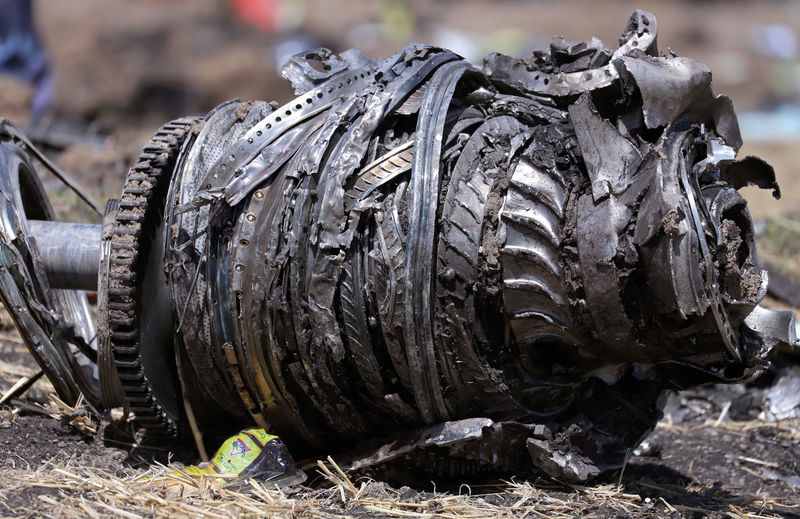By David Shepardson
WASHINGTON (Reuters) - Investigators looking into a Boeing (NYSE:BA) 737 MAX crash in Ethiopia that killed 157 people have reached a preliminary conclusion that an anti-stall system was activated before the plane hit the ground, the Wall Street Journal reported on Friday, citing people briefed on the matter.
U.S. safety investigators have reviewed data from the "black boxes" that were aboard Ethiopian Airlines Flight 302, four people briefed on the investigation told Reuters on Thursday. A preliminary report is expected as early as next week, the U.S. officials said.
The plane crashed on March 10 shortly after taking off from Addis Ababa.
Investigators of a deadly 737 MAX crash in Indonesia in October have also focused on the new anti-stall system, called MCAS. Boeing on Wednesday said a planned software fix would prevent repeated operation of the system that is at the centre of safety concerns.
Boeing's fastest-selling 737 MAX jet, with orders worth more than $500 billion at list prices, has been grounded globally by the Federal Aviation Administration (FAA) and other regulators, although airlines are still allowed to fly them without passengers to move planes to other airports.
The manufacturer said it had developed a training package that 737 MAX pilots are required to take before the worldwide ban can be lifted, proposing as it did before two deadly crashes that those pilots do not need time on flight simulators to safely operate the aircraft.
On Thursday, a lawsuit against Boeing was filed in Chicago federal court by the family of Jackson Musoni, a citizen of Rwanda, who died in the Ethiopian Airlines crash.
The lawsuit alleges that Boeing had defectively designed the automated flight control system. Boeing said it could not comment on the lawsuit.
The amount and quality of training that Boeing and airlines provided to 737 MAX pilots is one of the issues under scrutiny as investigators around the world try to determine the causes of two 737 MAX crashes within five months.
The U.S. Department of Justice is investigating Boeing's development process and what Boeing disclosed about MCAS.
The U.S. Transportation Department said on Monday that a new blue ribbon commission will review how the Federal Aviation Administration certifies new aircraft.
U.S. and European regulators knew at least two years before the Indonesian crash that the usual method for controlling the 737 MAX's nose angle might not work in conditions similar to those in two recent disasters, Reuters reported on Friday, citing a document.
The European Aviation and Space Agency (EASA) certified the plane as safe in part because it said additional procedures and training would "clearly explain" to pilots the "unusual" situations in which they would need to manipulate a rarely used manual wheel to control, or "trim," the plane's angle.

Those situations, however, were not listed in the flight manual, according to a copy from American Airlines seen by Reuters. Boeing declined to comment on the EASA document.